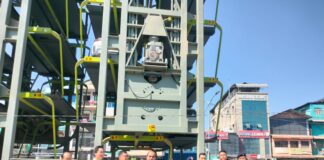New Delhi: In order to keep the spirit of 1971 alive, it is important that India and Bangladesh jointly fight forces that want to attack our mutual trust, Indian Prime Minister Narendra Modi said on Tuesday after talks with his Bangladesh counterpart Sheikh Hasina.
“Today, we also stressed cooperation against terrorism and radicalism. To keep the spirit of 1971 alive, it is also very important that we fight together such forces which want to attack our mutual trust,” the Prime Minister said.
Modi said India will continue to extend all cooperation to realize the vision of the late Bangbandhu for a “stable, prosperous and progressive Bangladesh”.
“Under the leadership of Prime Minister Sheikh Hasina, Bangladesh has made noticeable progress. In recent years, our mutual cooperation has also expanded in every area. Today, Bangladesh is India’s largest development partner and our largest trade partner in the region. Our close cultural and people-to-people relations have also steadily increased,” he said.
The Prime Minister said that the two leaders comprehensively discussed all bilateral, regional, and international issues.
“We both believe that drawing lessons from the Covid pandemic and recent global events, the two countries need to further strengthen their economies. With the expansion of connectivity and by the development of trade infrastructure on the border, the two economies will further connect with each other,” he said.
He said Bangladesh was India’s largest development partner and the largest trade partner in the region.
“Our close cultural and people-to-people relations have also steadily increased.”
Modi said the two countries will soon begin a discussion on a Bilateral Comprehensive Economic Partnership Agreement to further boost trade ties.
India-Bangladesh trade was increasing steadily, the Prime Minister said.
“We also decided to increase cooperation in sectors such as IT, space, and nuclear energy, which are of interest to our younger generations. We will also continue to co-operate on climate change and preserving shared heritage such as the Sundarbans.”
Modi said the increasing prices of energy have posed challenges for all developing countries and the unveiling of a Maitree power plant in Bangladesh will augment affordable power in the country.
1320 (660×2) MW supercritical coal-fired thermal power plant at Rampal in Khulna is being set up at an estimated cost of $2 billion with $1.6 billion as Indian Development Assistance under the Concessional Financing Scheme.
Modi said the two countries were engaged in useful dialogue to connect power transmission lines.
Talking about the 5.13 km Rupsha rail bridge which is a key part of the 64.7 km Khulna-Mongla Port single track broad gauge rail project, connecting for the first time Mongla Port with Khulna by rail, and thereafter to Central and North Bangladesh and also to the India border at Petrapole and Gede in West Bengal, the Prime Minister said that the inauguration of this bridge will increase connectivity between the two countries.
“Today, we have signed an important agreement on sharing water from the Kushiyara river. This will benefit southern Assam in India and Sylhet region in Bangladesh.”
The Prime Minister said that there are 54 rivers that pass through the Indo-Bangladesh border, and have been linked to the livelihood of the people of the two countries for centuries.
The Prime Minister expressed the hope that India-Bangladesh friendship will touch new heights in the next 25 years.
Hasina said she has had another round of “fruitful discussion” with Modi and its outcome will “benefit the people of both countries”.
“I appreciate Modiji’s visionary leadership that continues to provide added momentum to our bilateral relations.”
She said India was the most important and closest neighbor of Bangladesh. “Our bilateral relations are known to be role models for neighborhood diplomacy,” she said.


